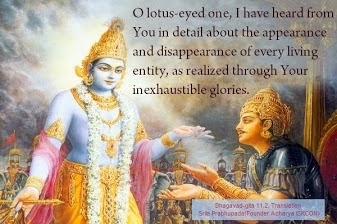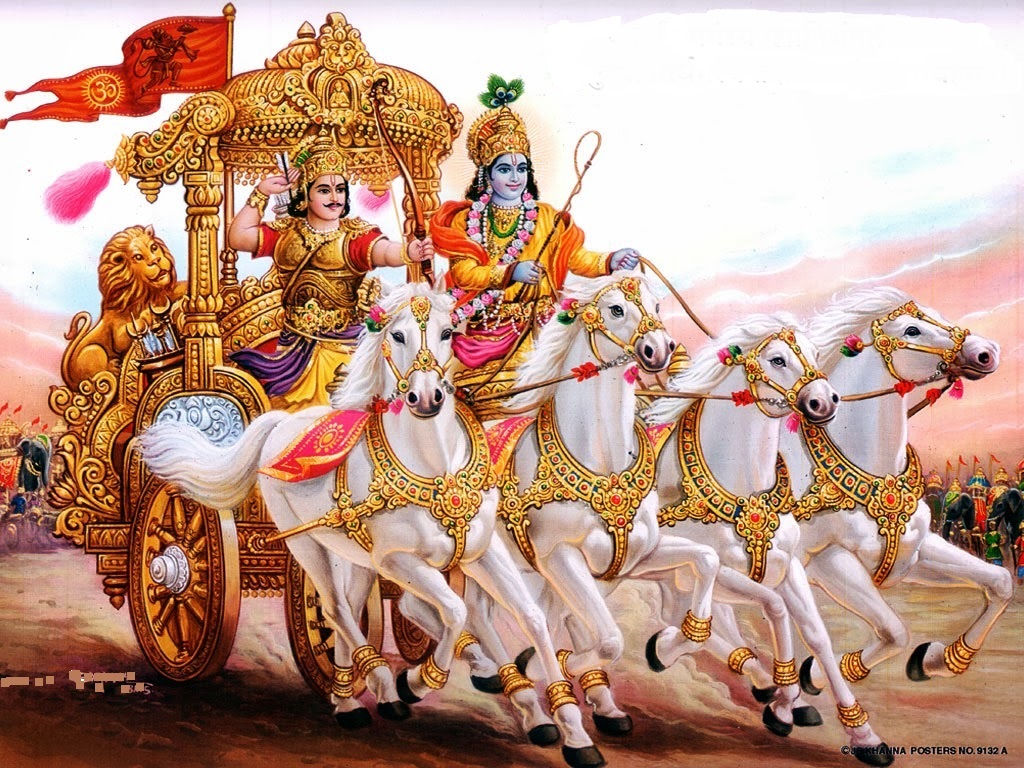Srimad Bhagavadgeeta :
Sunday,Jan12, 2013.
Srimad Bhagavadgeeta :
Chapter-5. ( Karma-sanyasa-yogam )
Slokam-8 & 9.
8).Naiva kincit karomiti yukto manyeta tattva-vit,
Pasyan srrvan sprsan jighrann asnan gacchan svapan svasan.
9).Pralapan visrjan grhnann unmisan nimishan api,
Indriyanindriyartheshu vartanta iti dharayan.
Na = Never;
Eva = Certainly;
Kincit = Anything;
Karomi = Do I do;
Iti = Thus;
Yuktah = Engaged in the divine consciousness;
Manyeta = Thinks;
Tattvavit = One who knows the truth;
Pasyan = By seeing;
Sravan = By hearing;
Sprsan = By touching;
Jighran = By smelling;
Asnan = By eating;
Gacchan = By going;
Svapan = By dreaming;
Svasan = By breathing;
Pralapan = By talking;
Visrjan = By giving up;
Grhnan = By accepting;
Unmisan = Opening;
Nimishan = Closing;
Api = In spite of;
Indriyani = The senses;
Indriya-artheshu = In sense gratification;
Vartante = Let them be so engaged;
Iti = Thus;
Dharayan = Considering.
'In divine consciousness I certainly never do anything' thus thinks one who knows the truth in his seeing, hearing, touching, smelling, eating, going, dreaming and breathing. Despite of his talking, forsaking, accepting, opening and closing his eyes he considers it as [merely] an engagement of the senses.
To the smelling, hearing, seeing, touching, walking, dreaming and breathing of the body the man of truth says: 'Most certainly I am, in my being connected, not doing a thing'; he considers all the talking, forsaking, accepting, opening and closing of his eyes, merely an engagement of the senses.
A person in the divine consciousness, although engaged in seeing, hearing, touching, smelling, eating, moving about, sleeping, and breathing, always knows within himself that he actually does nothing at all. Because while speaking, evacuating, receiving, opening or closing his eyes, he always knows that only the material senses are engaged with their objects and that he is aloof from them.
One who has realised the nature of the atma or soul knows the true nature of reality. Such a person reflects that through the senses of perception such as eyes and ears, the senses of action such as the voice, the pranas or life breaths, the physical body functions with all its corresponding objects; but factually I am separate as an individual consciousness from all these activities and virtually do not do any of these actions. The conception of doership is derived from contact with the senses which a living entity is coerced to accept from time immemorial due to past actions in past lives. But this doership is not an essential attribute of the atma and thus it is not necessary to accept. So I shall not accept it as being my essential nature. Thus does one situated in atma tattva or soul realisation reflect.
How would the performer of karma yoga or prescribed Vedic activities without attachment who has achieved atma tattva or realisation of the soul behave? Lord Krishna replies to this in these two verses. The yogi or one following the science of the individual consciousness attaining communion with the ultimate consciousness comprehends the reality that all bodily functions along with the senses are functioning independently and thus one is not subject to conceptions of doership. Seeing, hearing, smelling, tasting and touching are the functions of the eyes, ears, nose, tongue and body. When the eyes open and close does one think they are the opener and closer? In this way one should think for all actions one performs. Moving is the function of the legs, speaking of the mouth, pleasure of the generating organs and so forth. Breathing is a function of the vital force and includes all others as it sustains the entire body. Lord Krishna explains this exposition in the way of artha-krama or where the order of the meaning is more potent than patha-krama or textual position. The purport is that one should live their life free from the ego of I-ness and my-ness and conceptions of doership, knowing that all actions are the functions of the organs and senses and are independent from the individual consciousness.




Comments